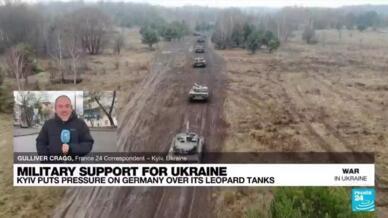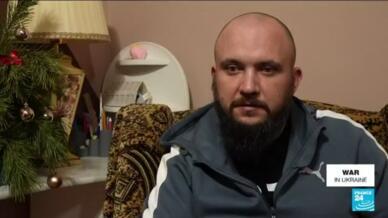On the surface, booming US shale gas production looks like the perfect solution for Europe as its reels from the energy crisis created by tearing itself away from Russian gas. But analysts say it is no panacea.
US shale gas output has lost none of its momentum, as the US shale revolution is fading as far as oil is concerned.
In western Texas’s Permian Basin – one of the world’s most important oil and gas production areas – gas prices actually went negative in October because output was so high that producers had to pay people to take it off their hands.
And compared to oil, “there is potential for more growth”, said Kenneth B. Medlock III, senior director at the Center for Energy Studies at the Baker Institute for Public Policy at Rice University in Houston.
This looks like the perfect situation for the US’s allies across the Atlantic as the energy crisis racks the old continent. Indeed, EU imports of liquified natural gas (LNG) from the US have already soared since Russia invaded Ukraine and Europe cut off its dependence on Russian gas – increasing by over 148 percent in the first eight months after the invasion compared to the same period the previous year. Most of this gas comes from shale drilling.
“The entire reason US LNG exports are even possible to begin with is because of the shale revolution,” emphasised Eli Rubin, a senior energy analyst at energy consultancy EBW Analytics Group in Washington DC. “If it weren’t for that, the US would be importing LNG on a pretty widespread basis, competing with European countries for natural gas supplies.”
‘The problem is export capacity’
Yet analysts caution that, while LNG from US shale can help Europe amid its energy crisis, it will not single-handedly rescue the old continent.
“I don’t think Europe will ever receive as much gas as LNG from the US as it did from Russia through pipelines,” said Samantha Gross, director of the Energy Security and Climate Initiative at the Brookings Institution in Washington DC. “Europe got a lot of gas from Russia; it’s a tremendous amount of gas to replace.”
“There is an issue in terms of how much gas the US can get to Europe, at least in the short term,” Rubin said. “The problem is export capacity, not the amount of gas the US is producing,” Gross agreed.
Exporting natural gas is a complicated and expensive process, requiring liquification, transport to export terminals, boats to move the gas to the country buying it, then a regasification process when it gets there. A lack of capacity at any of these points creates supply constraints – so supply is lagging a boom in demand.
The example of the Permian Basin last autumn illustrates this – there was abundant demand for all that gas, but as Rubin put it, “the pipelines do not yet exist to take of all the gas from West Texas to East Texas so it can be exported”.
“The US will take three to five years to really ramp up infrastructure for LNG export,” Rubin continued. “As far as the short-term outlook goes we do have this bottleneck in terms of export capacity.”
Importing non-liquified gas through a pipeline is therefore much cheaper and easier for Europe – coming without the need for liquification, transport by land and boat, and regasification. “One of the reasons why Russian gas was so cheap for Europe was that it came through a pipeline,” Rubin observed.
‘No one saviour’
Hence Europe has been keen to boost gas supplies from its near abroad, especially where pipeline infrastructure is already in place.
EU Commission President Ursula von der Leyen went to Baku in July to sign a deal doubling the bloc’s gas imports from authoritarian Azerbaijan, using a network of pipelines to Italy called the Southern Gas Corridor.
The same month, then Italian prime minister Mario Draghi travelled to Algeria to sign a series of deals to ramp up gas imports, even as a political crisis brewed in Rome. Again, a pipeline makes the gas simpler and less expensive to import than if it came in the form of LNG – namely the TransMed pipeline from Algeria to Italy set up in 1983. Closer to home, gas-rich Norway has turbocharged gas supplies to the rest of Europe, benefitting from the Langeled pipeline. And when it comes to LNG, Qatar has also become integral to Europe’s scramble for new gas sources.
But there are limits to all four of those countries as gas suppliers to Europe. “Any further increases in pipeline exports of natural gas from Azerbaijan and Algeria are likely to be small relative to the increase in global LNG capacity,” noted Stephen Fries, a nonresident senior fellow at the Peterson Institute for Economics in Washington DC and an associate fellow at Oxford University’s Institute for New Economic Thinking. “The pipeline from Azerbaijan to Europe is already operating at capacity. Algeria’s capacity to produce more natural gas is uncertain.”
As things stand Qatar exports over 70 percent of its LNG to Asian countries, locked into long-term contracts. With regard to Norway, the North Sea gas fields “are not depleted but they are not what they used to be”, Gross pointed out.
In the long term, the ecological transition away from fossil fuels should mean that European countries will no longer want to buy large quantities of gas, with the EU promising to become net zero by 2050 – although whether that will be soon enough to help prevent the catastrophic effects of climate change is another matter entirely.
But this long-term paradigm shift complicates Europe’s bid for a short-term solution to its energy crisis. “The biggest challenge for Europe buying gas is that it’s not clear they will want it for long enough,” Gross put it. “These are multi-billion dollar contracts, and 10 to 15 years of using the gas is not a long enough payback period.
“I hear a lot about US gas supplies saving Europe or someone else saving Europe from its energy crisis – but there’s no one saviour,” Gross concluded. “It’s going to take a portfolio of capacities to replace a lot of gas they got from Russia. That means a lot sources, plus consuming less gas – plus the energy transition.”
Source link
#shale #gas #save #Europe #energy #crisis

.jpg)

























